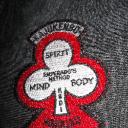Yahoo Answers is shutting down on May 4th, 2021 (Eastern Time) and beginning April 20th, 2021 (Eastern Time) the Yahoo Answers website will be in read-only mode. There will be no changes to other Yahoo properties or services, or your Yahoo account. You can find more information about the Yahoo Answers shutdown and how to download your data on this help page.
Trending News
For younger folks, do you know?
Do you know what style of martial art you study?
Can you name it for me? Do you know it's founder and history?
Thank you.
9 Answers
- K_JKDLv 58 years agoFavorite Answer
KungfFu Jeet Kune Do or KJKD
I've never met the creator because he died 15 years before I was born but his name was Lee Jun Fan aka Bruce Lee.
Created in the 1970s by Sijo Lee Jun Fan before his untimely demise and is more a method of training any style/s than a style itself but in the foundation it often includes the basic Wing Chun form Sui Lim Tao along with a few important classical Kung Fu concepts & theory's depending if they survive the lineage or not.
My specific lineage is based heavily on Wing Chun, Jujutsu (Japanese & Brazilian), Boxing (English & Thai) & Wrestling along with various other arts to some degree or another.
Source(s): Martial arts training since 1997 & doing what Sijo Lee did ever since - kajukatLv 58 years ago
When I first starting Kajukenbo, I was 21. I read about its "history" before in the old martial arts magazines. My original instructor also told us its supposed "history". It would now be considered "controversial" just like the history that Possum learned about Tae Kwon Do when he first started. But for beginners in a martial art, everything you read and everything you are told seems plausible. And you repeat it. The founders distorted the truth and exaggerated and maybe left out stuff. I am not sure if there exists a martial art where the students are told the truth, without any legends. And each martial art has its own reasons for rewriting history.
Fortunately due to the ease of sharing information on the internet, I pieced together what I personally believe to be a more accurate history of Kajukenbo, but those are only my opinions.
These days, in my original instructor's school and my current instructor's school, the history is not taught. Those it really matter? I am not sure. Maybe today's generation is not interested in the history of the martial art that they are training in.
Source(s): Kajukenbo. Sijo Adriano Emperado & 4 other co-founders: GM Peter Choo, Dai Shihan Joe Holke, "Uncle" Frank Ordonez, and GM Clarence Chang. Martial art founded by 5 U.S. Army buddies of Asian descent after World War II for self-defense in low income neighborhoods of Honolulu, Hawaii. - possumLv 78 years ago
I think I know where you're going with the question.
When I started Taekwondo, I knew the style and name of the school because it was situated on a T-intersection and it's name was visible in all 3 directions; this was located in the center of town, and so everyone knew of the place.
However, when I joined, I was in my low teens, and I did not know the nationality until soon after I joined. I was also blissfully unaware of my style's history and founder until midway into my MA career. What I now know, is that what I knew then was very controversial.
A few years ago, I started learning Aikido; before I joined, I did some research on the style and of my school and school's instructor.
In my school that I run, all of the students are aware of the nationality and some Korean phrases. They are not aware of Taekwondo founder or history. Many of my students have severe learning disabilities, and I do not enforce knowledge in this area, though it is provided. The adults in my school are aware of the founders and generally accepted history, and they are aware that TKD history is mired in controversy.
Throughout my training, I'd been introduced to a few styles - hapkido, karate, wing tsun. And in none of these cases was history or founder or any background information was covered. What I know now is a direct result of recent study.
I generally don't like history myself, but I do understand its importance. When I come across a junior student who is unaware of history/founder, I tend to forgive it. When that same student is unaware of it's culture, I have a big problem with that, though I don't recall any instances of these except when involving very young children. But senior students - and especially instructors - ought to have knowledge, no matter what side of any historical controversy that may exist they embrace.
And anyone above 2nd dan had better have some in-depth knowledge of history, culture, etiquette, and language (terminology).
Martial arts isn't about fighting - it's about a way of life that necessarily includes elements of culture and history. Without such knowledge, we wind up with clowns, for example, who think that bowing has anything to do with deitifying the person to whom they bow. Occasionally, a technique (like a flying side kick) can be explained and attributed to horse-trodden soldiers or to aspects of armor weakness - things that are not seen today.
And when knowing about a style's founder, that often gives clues - particularly in forms (kata, poomsae) - about what techniques mean, where they are derived, and what are the reasons for it's movement, shape, execution, etc.
In Taekwondo, for example, it's insanely difficult to find an instructor who admits to Taekwondo's Japanese ancestry, and knowing a founder or contributor to a style can provide details about a form or a philosophical concept here and there.
- 8 years ago
Motobu ha Shito Ryu, from Shogo Kuniba who studied Shito Ryu and had influences from Motobu Ryu from either Motobu Choki or one of his students.
Shito Ryu was founded by Mabuni Kenwa who studied under Itosu and Higaonna Kanryo.
Meishi ha Mugai Ryu Iaihyodo, from Niina Gyokudo who studied under Shiokawa and Nakagawa.
Founded by Tsuji Gettan Sukemochi after studying Yamaguchi Ryu under Yamaguchi Bokushinsai and received Menkyo Kaiden. Also studied Jikkyo Ryu which had a prolonged history which traces back to Hayashizaki Ryu.
Ultimately, the lineage is unimportant as one good or bad headmaster can improve or ruin how the art is taught, viewed, or interpreted. Hence why those who claim to be only this or that many generations removed from this or that head may teach something radically different from the famed instructor.
- How do you think about the answers? You can sign in to vote the answer.
- Anonymous8 years ago
Tae Kwon do- was used for the korean military
MMA-derived from brazilian vale tudo competions started out to see what the ultimate martial art was and royce gracie implemented cross training into it i would give founding credit to the gracie family and the UFC
BJJ-founder royce gracie
Jiu Jutsu- all i know it is very old and was originated in japan as a form of self defense
im 16 if this helps and my mma instructors teach me bits and pieces of kenjutsu, kung fu and close quarters combat
- 8 years ago
I am 15 I do wing chun. which is a form of kung fu and as legend goes was created by a woman called ng mui
- wattylerLv 48 years ago
Its name is Hapkido...style I guess is 'mixed'/eclectic?
No i never met him:)
I dont really believe the 'history' is free of political re-imaginings so i just know the broad strokes







